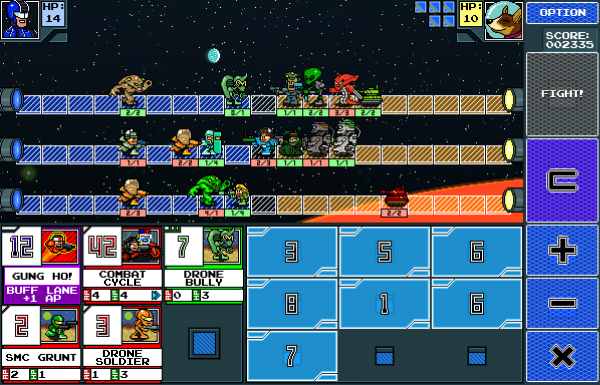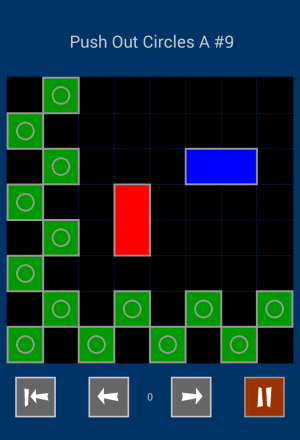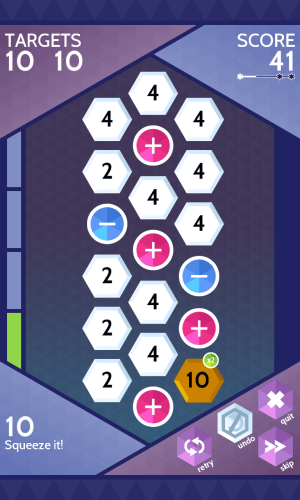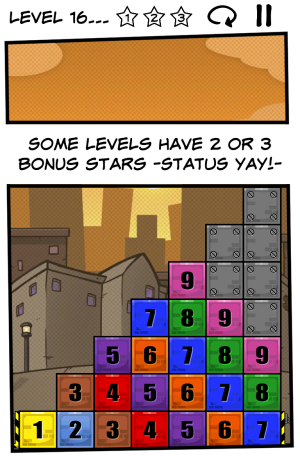A while ago I collected a few of the mathsy games I play on my phone to while away my commute. I’ve found a few new ones since then, so I thought I’d do a new post to tell you about them.
Calculords

Android, iOS, £1.76/$2.99
A really goofy game that fully owns its geek appeal: you play the last Star Nerd who battles to save the galaxy by doing sums. What’s not to love?
The gameplay is a mix of lane strategy and a deck-building card game, crossed with the Countdown numbers round; you play cards by combining the numbers you’re given using addition, subtraction or multiplication to reach the target score on a particular card. You get a bonus if you use up all your numbers, then you’re given another set of numbas and you get another bonus if you play all your cards.
The card-game mechanics and spacey setting give you more motivation to continue than the totally abstract Quento, covered last time, but eventually I got fed up with it – I played Magic: The Gathering once and found it completely unappealing – but I’m sure there are plenty of people whose brains will be expertly tickled by Calculords.
The Rectangles

Android, iOS, 60p/99¢.
I didn’t really get on with The Rectangles, but Ed Pegg, Jr. of mathpuzzle.com loves it, so maybe I’m not clever enough to appreciate it.
The Rectangles is very simple: you drag rectangles in the direction of their long sides to push other shapes around. Grey shapes don’t move, and the aim is to push all the green squares off the board. It gets hard quite quickly.
Sumico – the numbers game

Android (but iOS imminent, I think), free or £1.79 to remove ads.
It’s quite bold of Sumico to claim to be “the numbers game”, but I won’t hold that against it. Maybe it’s to distinguish from SUMICO Lubricant Co., Ltd.
This is another join-up-the-numbers-to-make-a-target game, but the second parent this time is Spelltower. When you combine two or more number tiles using the mathematical operation tiles, they’re replaced with a single tile containing the result of the calculation. The tiles accumulate score modifiers as you perform calculations with them, so there’s a lot to think about when deciding how to reach a target. I like how you have to really think about the laws of associativity – you get more points for splitting a calculation into a few steps, but sometimes that puts the other tile you need just out of reach.
Later levels add in multiplication, division, and “$x^2$”. In addition to the campaign, which introduces game mechanics gradually, there’s an endless mode that… doesn’t end.
I think I’m going to be playing Sumico for quite a long time.
Numolition

Android (72p), iTunes (69p)
A new game from the people who made Quento! Happy hooray! In Numolition, you’re presented with a tower of numbered blocks, which you have to blow up. You can blow up sets of two or more adjacent blocks with the same number. Where it gets clever is that you can slide blocks horizontally, or add blocks by sliding them into each other (but you can’t go over 9). Solving levels usually involves doing a bit of adding-up to work out what groups of numbers you can make.
In a final twist, levels sometimes ask you to leave one block with a particular number at the end. Tricky!
Previously: Games to entertain a commutative mathematician, along with more recommendations in the comments.
Have you got a favourite mathsy game that I don’t know about? Please share it!

Quite a late reply, and not sure if you’ve already heard about these games:
Euclidea – A game about constructing shapes/angles/lines with a straight edge and compass. It starts off rather easy, but becomes quite hard quite quickly.
Brilliant – Not sure if it’s a game, but I like trying the Problems of the Week on it. They’re physics and maths questions/puzzles but a bit trickier (and fun) to solve (than ordinary maths problems). The difficulty ranges from Basic to Intermediate to Advanced.